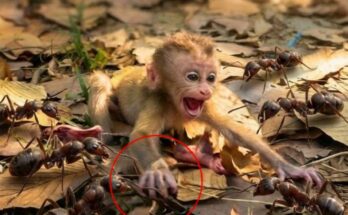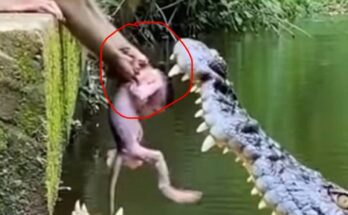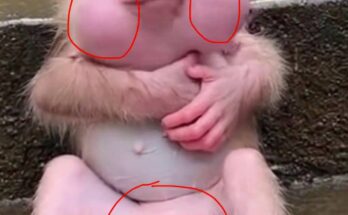
These unexpected interactions have caught the attention of wildlife observers, researchers, and animal lovers worldwide. Videos and reports from parts of Africa and Asia show scenes that almost seem scripted for a heartwarming film: baboons grooming puppies, carrying them gently like their own infants, or even protecting them from threats. At first glance, such behavior might seem cute or amusing, but it raises many questions about primate behavior, empathy, and cross-species bonding.
In several documented cases, baboons have been seen “adopting” puppies, particularly stray or vulnerable ones. The baboons sometimes carry the puppies under their arms, feed them scraps, or let them snuggle close for warmth and comfort. In some instances, the puppy becomes part of the baboon troop, living among them for days or even weeks. These behaviors have amazed observers because baboons are not known to domesticate or adopt animals outside their species.
So what motivates this peculiar behavior? There are a few possible explanations.
Firstly, baboons are highly social creatures with complex emotional and group structures. They exhibit deep bonding with their own young and show empathy and care within their troop. It’s possible that a maternal instinct — especially among females who have recently lost infants — could be redirected toward helpless animals like puppies. The puppy, small and vulnerable, may trigger the same nurturing response as an infant baboon.
Secondly, the interaction may stem from curiosity and playfulness. Baboons are incredibly intelligent and inquisitive animals. A puppy might simply be an object of fascination. What begins as play can sometimes evolve into something deeper, especially if the baboon is young or lonely.
Thirdly, there may be a practical side to this relationship. In some environments, baboons have learned to associate human settlements and their animals with food. Puppies, especially strays, are often found near human dwellings. A baboon troop that frequents these areas may become accustomed to their presence, and interactions can become increasingly familiar or affectionate over time.
However, not all behavior is nurturing. Some observers have also reported aggressive or rough treatment of puppies by baboons. What appears like care may sometimes border on control or dominance, particularly when a high-ranking baboon uses the puppy as a status symbol. In certain cases, a baboon may steal a puppy as an act of mischief, curiosity, or even territorial display, not realizing the fragility of the animal.
These mixed reports highlight the need for more research and careful observation. While some relationships between baboons and puppies seem genuinely caring, others may be more complex or even harmful.
Regardless of the intent, these interactions remind us of the emotional depth that animals possess. Baboons, despite their reputation for mischief and aggression, are capable of surprising tenderness. Their ability to interact with creatures outside their species — particularly ones as different as dogs — opens up new questions about interspecies empathy and intelligence.
For animal behaviorists, this phenomenon challenges the traditional lines between wild and domestic, predator and prey. It urges scientists and conservationists to consider how animal relationships adapt and change in human-influenced environments. It also reminds us, as humans, that kindness and curiosity aren’t exclusive to our species.
As more people share videos and photos of these encounters, public interest grows. Viewers are drawn to the unusual harmony between the wild baboon and the familiar domestic puppy. Whether it’s a moment of care, play, or just curiosity, these moments create a window into the complex world of animal emotions.
In the end, the story of baboons and their unusual behavior with puppies is not just about odd animal behavior — it’s about connection. In a world full of division and difference, even two completely different species can sometimes find unexpected companionship.


